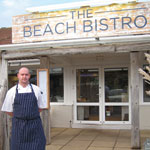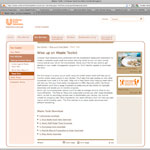Versatile soup is a real staple
Soup has proven to be a real staple - both on menus and in maximising profits. It also lends itself to reducing food waste. Diane Lane reports
Seasonal, fresh, wholesome and hearty are four words consumers frequently associate with soup and it has long been regarded as a menu staple. But there's another word caterers would do well to consider with regard to soup. Profit, and how to maximise it.
Liz Deutsch, category business lead at Nestlé Professional, says: "Soup remains a firm favourite with consumers in the UK, a fact backed up by sales growth of at least 5% since 2008. Therefore, chefs and operators should consider soup, especially the more popular tomato, chicken and vegetable varieties, an absolute menu must-have. It's easy to prepare, simple to store and incredibly versatile, as well as providing a strong profit opportunity."
Soup has had something of a renaissance in recent years with customers becoming accustomed to ever-more sophisticated recipes, and few other menu items can rival its versatility. It can be meat or vegetarian, traditional or exotic, simple or bold, and rustic or gourmet. It's a dish that spans all continents, cuisines and nationalities with an infinite variety of interesting flavour combinations possible.
The advent of dedicated soup restaurants and a glance at various menus confirms this. Leon is serving up beetroot and horseradish; and butternut squash, orange and ginger; while chicken, pumpkin and jalapeno; and Mexican red lentil, lime and pepper; grace the menu at Crussh. Diners at Eat have a choice that includes chicken laksa; and sweet potato and chilli.
Given the huge range of ingredients that can be incorporated into a soup, it lends itself well to a practice all chefs should be demonstrating, particularly in the current harsh economic climate, that of reducing food waste.
According to research from WRAP (Waste and Resources Action Programme) released earlier this year, the catering industry produces 600,000 tonnes of food waste each year, and yet the report suggests that 400,000 tonnes of it could be avoided. Furthermore, the Sustainable Restaurant Association's Too Good To Waste restaurant food waste survey report in 2010 showed that 65% of food waste comes from preparation.
This indicates that caterers have an opportunity to reduce the amount of food waste they produce and, considering that the wasted food has to be bought and then has costs associated with its disposal, it clearly makes good business sense to avoid producing waste in the first place.
Waste is an inevitable side-effect of cooking. But operators that can be creative with surplus ingredients will not only reduce avoidable food waste but also save money. It's estimated that every tonne of food waste produced costs a business £1,800 a year, so good waste management will add to your bottom line.
Chris Barber, chef, consultant and former personal chef to HRH The Prince of Wales, helped to develop Unilever Food Solutions' Wise up on Waste toolkit (see panel) with the Sustainable Restaurant Association. He says: "Menu planning is an essential part of kitchen management, especially nowadays when margins are getting squeezed from all angles. So, I suggest pairing common sense with creativity to make sure that your recipes and dishes deliver financially as well as creatively. Don't forget, you are business people as well as chefs."
If it's still fresh it should feature
These are used up in Hambley's variation on a classic saffron and red mullet soup. "We allow the fish to marinade well before cooking when we get some colour on to the fish to give it a real depth of flavour. I usually leave some fish heads in the mix and use some oily fish in the recipe to make the soup richer and the flavours more concentrated.
"The exact type of fish used isn't so important but the freshness of it is. My customers still get daily fresh fish and my GP stays healthy as well. I think soup should be an occasion - go crazy and serve it in some really sexy bowls."
intensify profit and flavour with good waste management
Paul Whitecross, from Angels with Bagpipes on Edinburgh's Royal Mile, considers using up trimmings to be the sign of a good chef. "I think you have to always look for ways to maximise use of ingredients," he says. "It helps your profit margin and can make a lot of difference in costs over a month."
As a trainee, Whitecross used to have a plastic container on his station and the head chef would always check what was being thrown away, so the practice to reduce waste as much as possible is well ingrained.
Instead of buying in cep powder, Whitecross dries out mushroom trimmings which he then turns into powder for sprinkling on wild mushroom and chestnut, or celeriac, velouté. "It takes the concept of the dish further and intensifies the flavor, without having to buy the powder which can be expensive," he says.
Similarly, he cooks the skins of oranges in syrup, which are then dried out and powdered ready for sprinkling on carrot and orange soup.
be intelligent in your approach to cooking
"In today's economic climate everyone is feeling the pinch - food prices have rocketed and customers want value for money. Creating interesting food that's still good value means being more intelligent in the way you cook. Not wasting anything is a massive part of this and soups are a particularly good way to offer value for money - they provide a very pure, clean, intense distillation of flavour for a relatively low overall ingredient cost."
"I spend a lot of time on soups and broths - we have two on the menu at the moment and I use a broth element in many of my dishes even when they're not traditional ‘soup' courses.
"Even though I'm a British chef, cooking British food, using primarily British ingredients, I am still inspired by cuisines from all over the world, including Asian cuisine where aromatic broths are so important. A good soup can be a whole meal in a bowl."
tackle trimmings to embolden soups
Following the purchase of seafood restaurant Livebait in Manchester by Richard Muir, Dave Spanner now heads up the kitchen as executive chef. He says that it's common sense to look at product and think how to get the most out of it.
"All chefs need to be doing it, it's good professional practice," he adds. "We buy in whole fish and do our own butchery. The fish trimmings - and veg trimmings - are used up in soups. Soups lend themselves well to the practice, particularly cream-based soups and bisques."
The menu at Livebait features a traditional bouillabaisse which, besides using fish bones, also makes good use of vegetable trimmings. The green tops of leeks, the top part of fennel bulbs, and celery tops are all incorporated in the soup. Additionally, the tops of red bell peppers are used to make rouille for serving alongside the bouillabaisse.
Spanner adds: "I'm more careful about what I put into consommé or a broth but bouillabaisse is rustic and cloudy so I can use a lot more trimmings."
waste reduction toolkit
United Against Waste already has the support of the Waste & Resources Action Programme (WRAP), food waste campaigner and author Tristram Stuart, food writer and chef Chris Barber and operators including Sodexo and Whitbread.
For more advice on menu management and practical ideas on transforming leftovers into creative new dishes, download the Wise up on Waste toolkit at www.unileverfoodsolutions.co.uk/wastetools.













